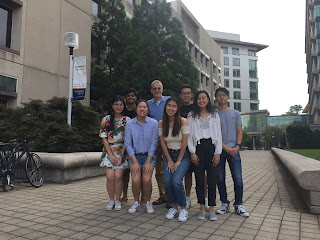Ji Won Lee is a junior majoring in Biology. She was awarded a Fall 2019 Independent Grant which she used to conduct research on autoimmunity under Dr. David Pallas.
Before my time at Emory, I had no prior research experience and was never exposed to a wet lab environment. After joining the Pallas Lab, I was able to learn so much, make friends with other lab members, and grow as an individual. Being involved in research has allowed me to not only be more self-sufficient, but also find the opportunity to collaborate and learn from others.
 One of the most unique aspects of our lab is that we are made up of only undergraduate students. As a result, most of the teaching, learning, and data collection is carried out by the students themselves. Being able to work with others your age and problem-solve together is one of the most rewarding experiences imaginable, especially in a research setting. Although it may be difficult at times as we are not experts in the field, the sense of camaraderie in the lab has been amazing. I have been able to learn so much from the senior members of our lab and have been exposed to many new connections, ideas, and advice along the way. In addition, if I ever face any roadblocks during the course of my project, I never feel alone as I have other members including my principal investigator, Dr. Pallas, who are there to guide me through it.
One of the most unique aspects of our lab is that we are made up of only undergraduate students. As a result, most of the teaching, learning, and data collection is carried out by the students themselves. Being able to work with others your age and problem-solve together is one of the most rewarding experiences imaginable, especially in a research setting. Although it may be difficult at times as we are not experts in the field, the sense of camaraderie in the lab has been amazing. I have been able to learn so much from the senior members of our lab and have been exposed to many new connections, ideas, and advice along the way. In addition, if I ever face any roadblocks during the course of my project, I never feel alone as I have other members including my principal investigator, Dr. Pallas, who are there to guide me through it.
During my first few semesters in the lab, I learned basic techniques such as performing PCRs, running gels, taking care of mice, and carrying out dissections. Our lab’s main focus is on the functions of LCMT-1, a methyltransferase, and its regulation of the PP2A pathway in mice. There are different research projects related to LCMT-1 and PP2A that are taken on by various groups in our lab.
 My project this year has been a long-term study focusing on the role of LCMT-1 in regulating autoimmunity in mice. In collaboration with the Kohlmeier lab, we have been taking blood samples regularly from both LCMT-1 knockout (KO) and control mice in order to be used for analysis. Specifically, we are looking for the presence of autoimmune phenotypes in the LCMT-1 KO mice by investigating T cell activation within serum samples through a series of flow cytometry experiments. In addition, we have been noting any inflammation of the spleen or kidney dysfunction in the mice towards the latter part of the study as other signs of an autoimmune phenotype.
My project this year has been a long-term study focusing on the role of LCMT-1 in regulating autoimmunity in mice. In collaboration with the Kohlmeier lab, we have been taking blood samples regularly from both LCMT-1 knockout (KO) and control mice in order to be used for analysis. Specifically, we are looking for the presence of autoimmune phenotypes in the LCMT-1 KO mice by investigating T cell activation within serum samples through a series of flow cytometry experiments. In addition, we have been noting any inflammation of the spleen or kidney dysfunction in the mice towards the latter part of the study as other signs of an autoimmune phenotype.
The URP independent research grant has greatly aided in the progress of my project, as it has funded for my mice this past semester and allowed me to obtain the proper reagents necessary for my flow experiments. It has given me the opportunity to experience self-sufficiency and give back to my lab. Over the past year, one of the most important lessons I have learned through being involved in research has been that it is a group process. Though we must be able to show critical thinking and effort on an individual level, the outcome is often determined by how well we work and communicate with others. As a result, I believe a huge factor that has allowed me to receive this grant and keep my project going are the people who have been working closely with me in the lab. But most importantly, Dr. Pallas has been one of my biggest supporters along the way and his patience for me has motivated me to keep learning, stay curious, and passionate about the process.
Visit the Undergraduate Research Programs website to learn more about applying for Independent Research Grants.
Comments
Post a Comment